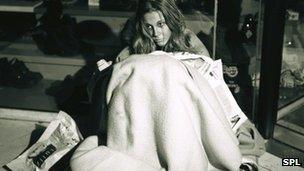More young migrants face destitution, Children's Society says
- Published
- comments

It is difficult to keep track of the numbers of young refugees who have become homeless.
More must be done by government to help prevent young refugees and asylum seekers from falling into destitution, a children's charity has warned.
The Children's Society says it has seen a "noticeable rise" in the numbers of child migrants seeking its help.
It is behind a report suggesting more children are suffering homelessness and hunger as a result of restrictions on the benefits they can claim.
The UK Border Agency said it took children's welfare extremely seriously.
The "I Don't Feel Human" report documents young people's experiences.
The charity said it had been commissioned after it saw a "noticeable increase in the number of destitute young people accessing our services".
However, it admitted that it was difficult to keep track of how many children were affected in the UK.
The report said: "While The Children's Society does not operate services for asylum-seeking and migrant children in every region of the UK, our work in London, the Midlands and the north has revealed widespread incidence of destitution and it is clear that this is not limited to these areas alone."
The Children's Society's policy director, Enver Solomon, said these children were being treated as if they had some kind of "second-class status" but the UK Border Agency and local authorities still had a duty to safeguard them.
"We estimate that thousands of children exist in the shadows of our communities, having their lives damaged by an approach that irresponsibly prioritises immigration control above the best interests of children," he said.
The charity said the government had to urgently review what support was provided to these vulnerable groups. It said the previous Labour government had introduced a policy of "forced destitution" by cutting benefits for asylum seekers in order to discourage others from applying.
The result, according to the report, is that increasing numbers of children whose asylum claims have been refused, and who have not been removed from the UK, are now sleeping rough and are vulnerable to violence and sexual exploitation.
'Self-harming'
The report states that some of the young people it had seen had serious illnesses and mental health problems. Some self-harmed and tried to kill themselves, while others felt they had no option but to have sex in exchange for food or shelter.
The charity said that it had documented an increase in destitution among young migrants using its "New Londoners" service.
In said between 2009 and 2010, 25 out of the 174 young refugees (or 14%) who used the scheme would be regarded as destitute.
In the 2010-11 period, this figure rose to 17% with 48 out of 189 finding themselves destitute.
Between April and September last year, 46 out of 133 young people (34%) using the service were destitute.
The report defines destitution as "the lack of regular access to essential resources such as food, clothing, toiletries, medicine and a place to live".
A spokesman for the UK Border Agency said: "We take the welfare of children extremely seriously. Support is provided to asylum seekers who would otherwise be destitute until a decision on their application is made.
"But when we and the courts have decided that they do not need international protection, support is discontinued and we expect them to return home voluntarily.
"Support is given throughout the asylum process to families with children who are facing destitution."
- Published18 February 2012
- Published4 February 2011
- Published1 November 2011